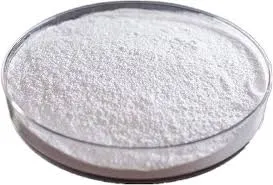
Aug . 21, 2024 09:12 Back to list
Understanding Redispersible Polymer Powders and Their Applications in Construction and Coating Industries
Understanding Redispersible Polymer Powder Applications and Benefits
Redispersible polymer powder (RPP) is an innovative material widely used in construction, adhesives, and coatings. These powders are primarily derived from emulsions of synthetic polymers, which have been dried into a fine powder form. When re-dispersed in water, these powders form a stable solution that can enhance the properties of various applications.
Composition and Production
Redispersible polymer powders are typically produced from polymers such as polyethylene, ethylene-vinyl acetate (EVA), and styrene-acrylics. The production process often involves atomization, where the liquid emulsion is transformed into a fine powder through drying techniques such as spray drying. The resulting RPP retains the functional characteristics of the original polymer, making it viable for various applications in numerous industries.
Key Properties and Benefits
One of the most significant advantages of RPP is its ability to improve the performance characteristics of construction materials. When added to cement-based formulations such as mortars and plasters, RPP enhances adhesion, flexibility, and water resistance. This leads to increased durability and longevity of the materials used in construction. Additionally, RPP improves the workability of formulations, allowing for easier application and better finish.
Another noteworthy property of RPP is its impact on the mechanical strength and thermal stability of the end products. The presence of the polymer improves the toughness of brittle materials, making them more resilient to cracking and wear. This is particularly beneficial in environments that subject materials to stress and temperature fluctuations.
Applications in Various Industries
redispersible polymer powder wiki

RPP finds extensive use in the construction sector, particularly in products like tile adhesives, self-leveling compounds, and repair mortars. Its ability to provide flexibility and adhesion makes it indispensable for modern construction practices. The use of RPP in tile adhesives allows for effective bonding on various substrates, accommodating any dimensional changes that may occur due to temperature variations.
Beyond construction, RPP is used in paints and coatings, where it contributes to improved spreadability and adhesion to surfaces. This results in longer-lasting finishes, reduced maintenance requirements, and more attractive appearances. In addition, RPP modifies properties like water resistance and resistance to chalking, providing enhanced durability for exterior applications.
The laminate and flooring industries also benefit from redispersible polymer powders. By incorporating RPP into composite materials, manufacturers can achieve better mechanical properties and improved stability. This innovation supports the development of lightweight yet strong flooring solutions that meet consumer demands for aesthetics, resilience, and sustainability.
Environmental Considerations
As the construction industry increasingly prioritizes sustainability, the incorporation of RPP aligns with greener practices. Redispersible polymer powders can enhance the performance of eco-friendly materials, such as those made from recycled components, reducing reliance on conventional resources. Additionally, water-based formulations containing RPP can help reduce VOC (volatile organic compounds) emissions, contributing to healthier indoor environments.
Conclusion
In conclusion, redispersible polymer powder is a versatile and high-performing component that is revolutionizing various industries, particularly construction and coatings. Its ability to enhance the physical and mechanical properties of formulations makes it an essential additive for creating durable, resilient, and sustainable products. As technology and manufacturing processes continue to evolve, the role of RPP is expected to expand, leading to innovative solutions that address the growing demands for quality and sustainability in the marketplace.
-
Unlocking the Benefits of HPMC Products: A Gateway to Versatile Applications
NewsAug.07,2025
-
Unleashing the Potential of HPMC Ashland: A Comprehensive Look
NewsAug.07,2025
-
Tile Bonding Cellulose: The Key to Superior Adhesion and Durability
NewsAug.07,2025
-
Hydroxypropyl Methylcellulose Powder: The Versatile Component in Modern Pharmaceuticals
NewsAug.07,2025
-
Hydroxyethyl Cellulose: The Versatile Solution for Various Industries
NewsAug.07,2025
-
Hydroxyethyl Cellulose (HEC): The Versatile Polymer for Various Applications
NewsAug.07,2025







